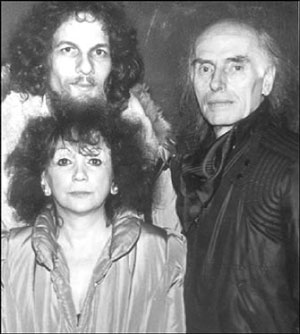
BY JERRY TALLMER | The spear she flung in fury sixty-something years ago has not yet hit the ground.
Not quite.
But now?
Is the longest-running show in town — any town, every town, wherever on the globe — once and for all about to close its doors forever?
One could say: “Drop the curtain forever,” except everybody knows the Living Theater doesn’t employ any actual curtains.
No matter. The point is that as of the final occurrence on February 23 of “Here We Are,” a “participatory play” about anarchism — what else? — at the Living Theater’s final venue, 21 Clinton Street, just below Houston on the Lower East Side, there will, short of divine intervention, be no more Living Theater, and the sole surviving co-founder of that remarkable permanent artistic revolution will be moving from her apartment upstairs at that address to the protective arms of the Lillian Booth Actors’ Home assisted-living facility in Englewood, New Jersey.
It was in the very early 1950s that this spirited young woman named Judith Malina, on stage at the historic Cherry Lane Theater on hidden-away Commerce Street in Greenwich Village, broke off her rehearsal of one of the ancient Greeks — Euripides? Sophocles? — to hurl that spear at an intruding Fire Department inspector.
That got her fledgling, super-avant-garde Living Theater company kicked out of that venue. (She and her husband had come Downtown from putting on plays and readings in Judith’s parents’ rambling old West End Avenue apartment.)
The deceptively fragile-looking, steel-willed, painter-poet husband was Julian Beck, co-founder and brilliantly gifted set designer of the Living Theater. Judith was 25 years old. Julian was 26.
Quick Jean-Luc Godard jump cut to the year 2006 and the premises Judith and Hanon’s new residence up over the Living Theater’s own new home, three or four venues and 55 years later, at 21 Clinton Street. Hanon is actor and playwright Hanon Reznikov, who became Judith’s husband after the 1985 death at age 60 of Julian Beck, whom they both loved. Hanon is 57 years old and, when he comes over to greet a visitor, appears a foot or so taller than 80-year-old Judith.
The visitor is a newspaperman and critic who many years ago — the summer of 1959 — had saved from sudden extinction not only the 14th Street Living Theater production of “The Connection,” young Chicago-hatched Jack Gelber’s “jazz play” about a roomful of junkies waiting for their fix, but quite probably had saved the very existence of the Living Theater itself, at least for the next 44 years.
Well, as this newspaperman and old ally enters the room at 21 Clinton Street, that same Judith Malina jumps to her feet, flings out her arms, and starts reciting, passionately, purely from memory, on tiptoes, the great last stanza of Alfred Lord Tennyson’s “Ulysses”:
It may be that the gulls will wash us down, / It may be we shall touch the Happy Isles, / And see the great Achilles, whom we knew. Tho’ much is taken, much remains, and tho’ / We are not now that strength which in old days / Moved earth and heaven, that which we are, we are /One equal temper of heroic hearts, / Made weak by time and fate, but strong in will / To strive, to seek, to find, and not to yield.
And then she looks me in the eye — for yes, I am that newspaperman and critic — and hurls at me that last line, “To strive, to seek, to find, [loud burst] AND NOT TO YIELD!”
They’ve given her a 10-year lease. She looks at me girlishly as she says: “Do you think it’s nervy for an 80-year-old woman to sign a 10-year lease?”
The Living Theater opened on Clinton Street in the spring of 2008 with a new production of one of its hardest-impact shockers, Kenneth H. Brown’s “The Brig,” set in a U.S. Marine Corps barbed-wire punishment center evocative of — or forecasting — Guantanamo.
It was during the run of “The Brig” in 1963 that the feds moved in and padlocked the show for alleged insufficient payment of taxes. One last audience came over the roof and burst the padlocks to see a bootleg performance of “The Brig,” and Judith and Julian did time in jail (30 days for her, 60 days for him) for causing disorder — by insistence on being heard — in the court. After which, Judith and Julian and the entire Living Theater split for Europe and burgeoning fame around the world.
Hanon Reznikov, playwright, director, actor, husband No. 2 of Judith Malina, was killed by a stroke and pneumonia at age 59 on May 3, 2008.
Part of what killed him, Judith Malina thinks, was the daily and nightly strain of trying to make an at least break-even go of the Living Theater down there on Clinton Street.
Holding things together since the death of Hanon has been a young actor named Brad Burgess, who joined the Living Theater in 2006 and has since become its executive producer and a hard-working personal assistant to Judith Malina.
Born and bred in suburban Dracut, Massachusetts, Burgess turns 28 on March 1, the day Judith — burdened with emphysema — is to take up residence at the Actors’ Home living and nursing facility in New Jersey. He hopes to keep the Living Theater going through affiliation with neighborhood groups, but that remains to be seen.
“Here We Are,” the concluding event at Living Theater, Clinton Street, is an exploration of — naturally! — anarchist collectives in 1870 France, 1920s Ukraine, 1930s Spain.
Way back in 2007, when Judith Malina was only 81 years old, The New York Times asked her if she still believed in pacifism and anarchism.
“Still?” she’d cried. “I’m just beginning! Still?”
The New York Times had best watch out. Where Malina goes — unyielding, spear in hand — revolution follows.




































